‘Brazen’ extortion, business disruption tactics by some Indonesian civic group members spark calls for tougher enforcement
While most of the approximately 550,000 civic organisations in the country are benign, a few have gained notoriety for their members’ involvement in assault, extortion and other forms of violence.
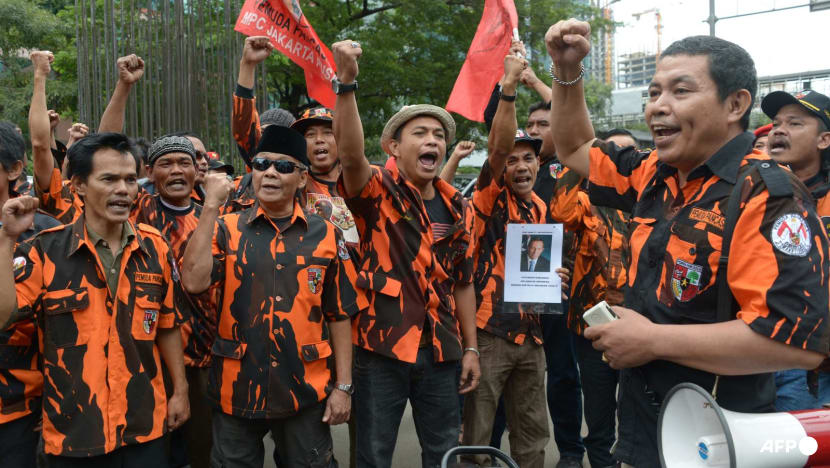
Members of Indonesian civic organisation Pancasila Youth chant protests during a demonstration in front of the Australian Embassy in Jakarta on Nov 26, 2013. (Photo: AFP/Adek Berry)

This audio is generated by an AI tool.
JAKARTA: Employees of a rubber factory got a shock in late April when half a dozen men allegedly stormed their workplace in Indonesia’s Central Kalimantan province, ordered them to stop what they were doing and claimed control over the facility, according to police reports.
Inside the factory, the men reportedly brandished a banner emblazoned with the words: “Operation of this factory and warehouse is being seized by GRIB Jaya Central Kalimantan” referring to the organisation, United Indonesian People’s Movement.
The group also demanded that the factory hand over the 1.4 billion rupiah (US$84,572) it reportedly owed to its client, said a police statement on May 2.
The rubber factory is not the one believed to be affected by such demands.
A few weeks before, business owners in various locations across the Greater Jakarta area took to social media claiming that they have received letters from another organisation: Pancasila Youth (PP) around the Muslim holiday Idul Fitri.
In one letter dated Apr 2, a West Jakarta chapter of PP, reportedly asked businesses in the area to: “Share some of your blessings and joy with us, so (we may) enjoy and celebrate Idul Fitri.”
Days before, another PP chapter in the Jakarta outskirts of Depok allegedly also distributed a similar letter.
Some business owners said they feel that they were being extorted.
Indonesia has around 550,000 of these so-called civic organisations – or “ormas” as they are known in Indonesia – which are registered by the Indonesian home affairs ministry. In some provinces, these organisations receive public funding and government grants.
While most are benign, there are organisations such as GRIB Jaya and PP which are notorious for having members arrested for and convicted of assault, extortion and other forms of violence.
These organisations have said that these members’ alleged criminal actions are not representative of the groups as a whole and they welcome the authorities taking action.
The police said last Friday (May 9) that they have resolved over 3,300 cases of thuggery since launching a nationwide operation against rogue members of civic groups.
“This operation is concrete proof of our commitment to eliminate thuggery, which has been undermining the investment climate and compromising public safety,” national police spokesperson Sandi Nugroho was quoted as saying by Tribunnews.
“We will not tolerate any intimidation, extortion or violence, whether carried out by individuals or groups under the guise of mass organisations.”
Shinta Kamdani, chairwoman of the Indonesian Employers Association, said the business community is getting anxious about members of these groups.
“We have heard cases of companies being extorted for security money, holiday allowances and even transportation and catering contracts,” she told CNA.
When demands are not met, members of these groups reportedly disrupt industrial operations by staging protests or blocking access to factories or construction sites.
The Indonesian Industrial Estate Association estimated that the disruptions and instability caused by these groups is costing Indonesia tens of billions of dollars in lost investment.
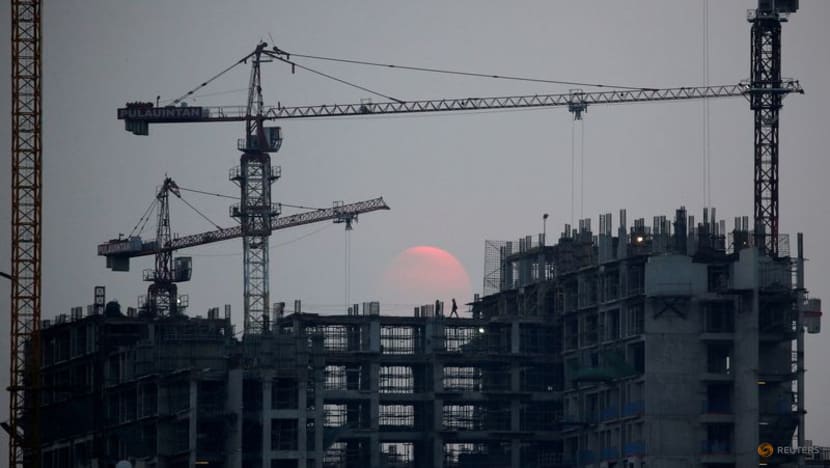
Investor confidence in Indonesia is also at stake, according to some experts, who call on the authorities to crack down on the culprits.
“Disturbances caused by members of these groups increase the cost and uncertainty of doing business in Indonesia,” public policy expert Achmad Nur Hidayat told CNA.
The Jakarta National Development University lecturer added that confidence from investors is key to the country’s ability to dampen the effects of a looming trade war, caused by United States President Donald Trump’s plan to impose reciprocal tariffs.
It is also needed to fulfil Indonesian President Prabowo Subianto’s campaign promise of creating 19 million jobs during his five-year presidency and combat Indonesia’s rising unemployment and dwindling middle class.
IS THE PROBLEM GETTING WORSE?
These groups have been around for years.
PP was established in 1959 by an Indonesian Army general to rival the then-growing communist movement in the country.
Meanwhile, GRIB Jaya was established in 2011 by a former convict who served multiple sentences in prison for extortion and vandalism, Rosario de Marshall, who is popularly known as Hercules.
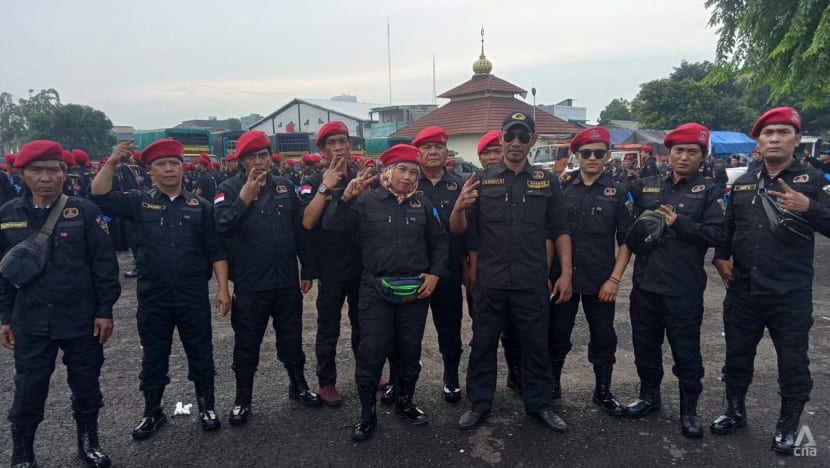
While cases of violence involving members of these groups have been recorded for years, widespread criticism and calls for the government to penalise these organisations have been gaining momentum recently due to a rise in reported cases of violence.
“People were shocked by how brazen cases involving these ormas members have been,” public policy expert Trubus Rahardiansyah told CNA.
According to the police, a member of GRIB Jaya last month brandished his pistol and fired three shots at the window of an excavator at a construction site in the southeastern outskirts of Jakarta.
One worker was reportedly injured by glass shattering from the shots.
The police later identified the shooter by his initials: TS, saying that he was the head of the local chapter of GRIB Jaya.
But as they were trying to arrest the man at his home on Apr 18, the police said that several GRIB members intervened.
"They assaulted our officers as well as damaged and burned vehicles used by officers from the Depok police," Jakarta Police criminal investigation director Wira Satya Triputra told reporters on Apr 22, as quoted by Detik news portal, adding that one officer was badly injured and three police vehicles were damaged in the incident.
The senior commissioner said that the police have arrested five GRIB members involved in the assault and charged them with obstruction of justice and are on the hunt for two more members of the same organisation.
TS is being charged with illegal possession of firearms and intimidation.
Gun ownership is heavily regulated in Indonesia, with very few individuals permitted to own a firearm let alone use them outside of a shooting range.
In Indonesia, illegal firearm possession, particularly when used in a crime, can carry a maximum penalty of life in prison.
Indonesians are also alarmed at how some members of these organisations are not only targeting big businesses but also regular citizens.
On Feb 15, two PP members were arrested after allegedly trying to extort money from several kindergarten teachers who were overseeing a marching band rehearsal in the southwestern outskirts of Jakarta.
In a video which has since gone viral, one of the perpetrators was seen brandishing a knife at the teachers as pupils and their parents watched in horror.
“These acts immediately grabbed public attention because they came at a time when businesses are worrying if they will be able to survive the trade war and people worrying if they will still have a job in the near future,” public policy expert Trubus said.
Indonesia’s minister for manpower Yassierli told a parliament hearing on Monday that more than 24,000 people had already lost their jobs between Jan 1 and Apr 23.
The minister said tens of thousands more are at risk of losing their jobs because of the trade war, particularly in the textile and furniture sectors which are mostly bound for overseas markets.
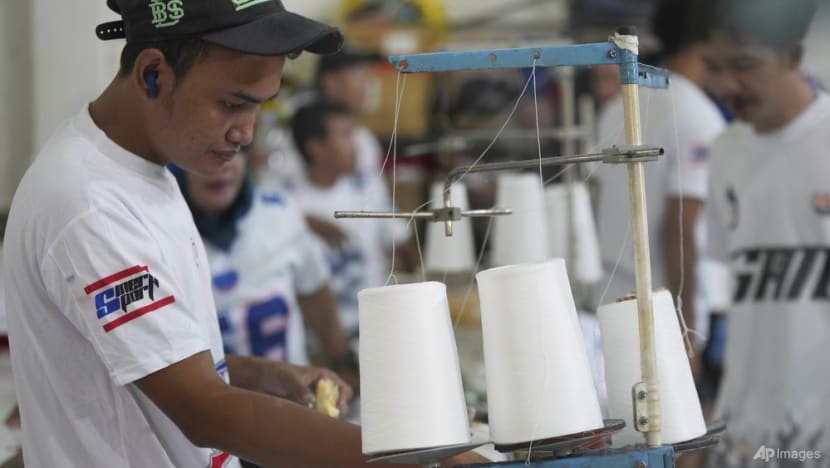
CAUSE FOR CONCERN
Sanny Iskandar, chairman of the Industrial Estate Association, said several investors have become so alarmed at the situation that they have been writing letters to Prabowo, asking the president to provide guarantee that their business ventures will be free from ormas members.
“But they still happen everywhere. We still see people in (ormas) uniforms staging demonstrations, disrupting production, blocking roads, even in areas where such demonstrations are not allowed,” Sanny told CNA.
Deputy speaker of the Indonesian people’s consultative assembly Eddy Soeparno said on Instagram on Apr 20 that several foreign investors have also spoken to him about the disruptions they face, including China’s BYD and Vietnam’s VinFast.
Both electric vehicle companies are building factories in West Java’s Subang regency but Eddy said “thugs disguised as ormas” are demanding security money from every truck hauling construction materials and equipment.
Four days after the post, local police arrested nine people accused of extorting money from drivers.
Edi Juhaedi, spokesman of the Subang police, said the suspects have allegedly been running the racket since December and are being charged with extortion. The police commissioner however refused to identify what ormas the suspects belonged to.
Both companies refused to comment on the incidents but stated that construction of their factories will proceed as planned.
As more and more companies came forward with their experiences dealing with rogue ormas members, coordinating minister for politics and security Budi Gunawan said that the government is forming a task force consisting of several law enforcement agencies, the military and a number of ministries to handle the matter.
“The government will not hesitate to take strict actions against all forms of thuggery and ormas activities which upset society and have the potential to disrupt investment and businesses,” Budi said in a statement last Tuesday.
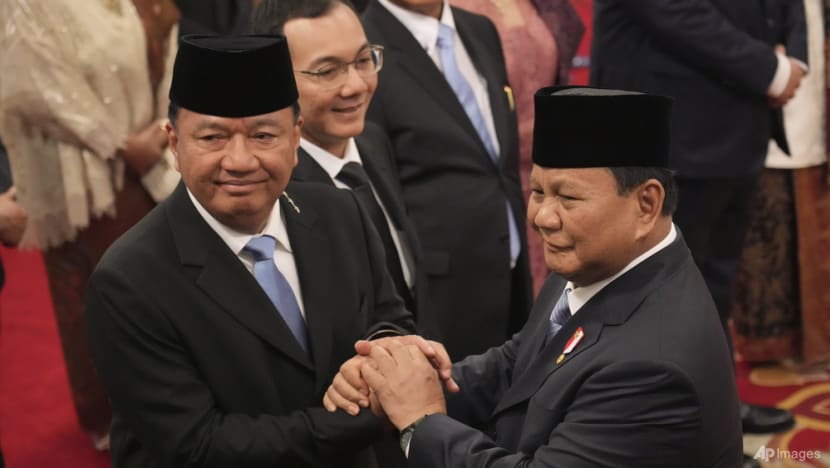
Separately, the Indonesian National Police said it has instructed every provincial, regency and district police to detect, prevent and take action against “all activities which can disrupt public order.”
“We want to make every business owner in Indonesia feel that they are protected and that the law will always be upheld,” national police spokesman Trunoyudo Wisnu Andiko told CNA.
The GRIB and PP said that the actions of their members do not represent their organisations and welcome law enforcers to investigate criminal cases involving their members.
“I ask (law enforcers) to go down hard on (law-breaking GRIB members),” GRIB chairman Hercules told reporters on May 2.
“No one is above the law. I have told my members that you guys are not above the law. I too am not above the law.”
PP also promised not to intervene in investigations against their members should they break the law.
“Our chairman (Yapto Soerjosoemarno) strictly prohibits all of our members from soliciting money from anyone,” Badar, a spokesman for the Jakarta chapter of PP, told CNA. “We will dismiss any member who is involved in drugs or crimes.”
HOW SHOULD INDONESIA RESPOND?
Experts said that for years, the authorities have failed to take strict action against these groups because some are massive in size with leaders who are politically well connected.
In its website, PP claimed that it has more than 9 million members across Indonesia. Meanwhile GRIB Jaya claimed that it has more than 1,000 chapters across the archipelago.
“With such a massive support base, politicians often woo these groups for their political support in time of elections,” public policy expert Achmad said.
“The fact that many public officials are starting to speak out against them means that they have crossed the line.”
The Indonesian Home Affairs Ministry is currently reviewing the existing law on civic organisation and looking for ways to provide more oversight on the 550,000 registered groups in Indonesia.
“We want to see if certain acts are systematically coordinated within the organisation,” minister Tito Karnavian said on Apr 25, as quoted by Antara news agency.
“If that is the case, then we can penalise the organisation and not just the operators on the ground.”
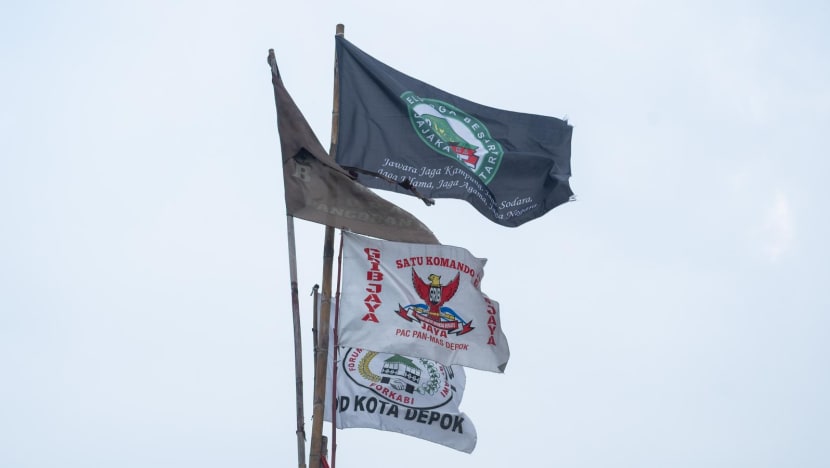
Meanwhile, the government has reportedly roped in military intelligence personnel to help tackle rogue civic groups.
"The primary focus of these personnel will be on preventive efforts. They will collect and analyse intelligence to prevent any acts of thuggery," commander of the National Military Police Headquarters Yusri Yunarto said on May 7, as quoted by Tempo.
Indonesia has disbanded organisations it deemed unlawful before. In 2017, the government disbanded Hizbut Tahrir Indonesia on the grounds that the organisation’s mission of establishing an Islamic caliphate is not in line with the country’s Constitution and ideology.
In 2020, Indonesia disbanded the Islamic Defenders Front after several members were convicted of terrorism. The government also said that its members often engage in violence, coercing others to comply with Islamic laws and customs.
Experts however criticised the fact that the decision to disband both groups was made by the government.
“The power to disband an organisation should be left in the hands of the courts through a transparent judiciary process,” public policy expert Trubus said.
Instead, he stressed, Indonesia should step up its law enforcement efforts and leave little room for anyone to commit acts of extortion and racketeering.
“Law enforcers should step up patrol, heighten security, take actions against any infraction and establish the rule of law,” he said.
“As soon as these groups realise that such practices no matter how small will not be tolerated or go unpunished, maybe these people will abandon their old ways and become productive members of society.”

















